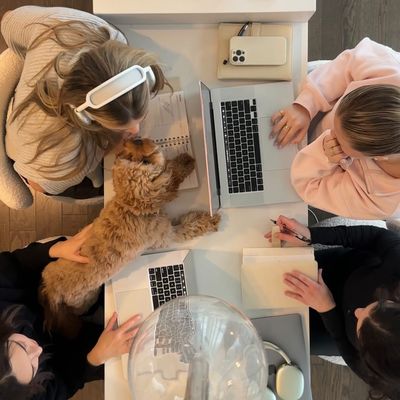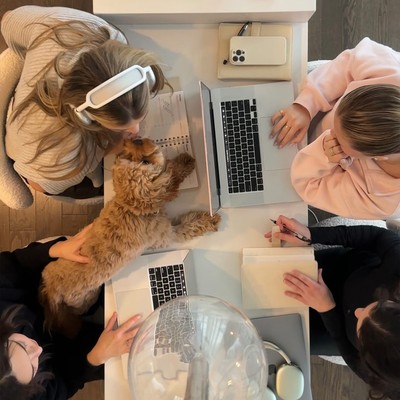

10 Tips To Help You Smash An Internship
Do Your Homework
Unfortunately, homework doesn’t stop once you’re done with education. As Kristen Buckheit of Resource Solutions explains, “You’ve got to show a keen interest in your industry – reading up about it will demonstrate that you are dedicated and have a genuine interest.” She suggests: “Stalk the company you’re joining on social media. Understanding the type of content the company produces and catching a glimpse into examples of its work will give you a head start before you get there.” So, social media stalking is allowed – good to know.
First Impressions Are The Biggie
Bethany Windsor of Generation Logistics can’t emphasise this one enough: “Be prepared. Have all of your paperwork – passport, driving licence etc. – ready to go so you’re not wasting a minute of good experience!” She’s also got some advice on what to wear: “It is better to be overdressed than underdressed. Tomorrow, you can leave the jacket at home if it’s not what everyone’s wearing, but on the first day, be keen and be proud of it!”
Aimee Treasure at Templeton and Partners has another important reminder: “Get plenty of rest the night before so you’re feeling ready to go; and plan your journey to arrive 15 minutes early, so that even if you have transport problems, you arrive in plenty of time.” The early bird gets the worm.
Positivity Is Contagious
Nerves are to be expected, but if you can hold them down, a smile really goes a long way. Moe McCarthy, founder of lifestyle PR agency MMC Communications, says: “Positivity is one of the key attributes I want to see in a potential colleague. During an internship I want to be impressed with their attitude to learning, convinced that they’re genuinely interested in advancing their knowledge and skills with us, and sure of their naturally friendly and approachable demeanour. Being able to get along with people is really important when you’re part of a team.”
Fran Nolan, MD at Tribera, seconds this: “Make an effort with every employee. Being a new person in the office, you have a great opportunity to make a first impression with each and every member of staff. So, take the time to introduce yourself where appropriate, and try to get to know people further than their name and job title. This will make you memorable, and will give you the advantage of knowing who to go to if you have questions.”
Networking Is Key
Okay, so your foot is in the door, now what? Nikki Francis-Jones, MD at The Wilful Group, advises: “Take the initiative and ask to attend networking events, team meetings and socials within the company. Actively seek out networking opportunities online that you think are relevant to your company and their clients. Ask your buddy or line manager if you think it’s relevant and of interest and, if so, ask if you can accompany a team member to listen and learn from them.”
Ed Johnson, CEO of PushFar, says social media is useful too: “LinkedIn is a must – not only during your time at a company. In the lead-up to it, you can try connecting with a few people in the organisation, introducing yourself and saying you're looking forward to the internship. It'll make the first day less daunting – and 99% of interns won't bother networking until it’s too late.”
Ed also has an insider tip for getting some face time with senior management: “Reverse mentoring is increasingly gaining traction with organisations as a way to link up all levels of seniority. Ask your organisation whether they offer a reverse mentoring programme and whether the senior leadership team would be open to reverse mentoring.”
Don’t let the relationship end when you step out the front door, either. Nikki adds: “Keep in touch with the hiring manager to keep them up to date with what stage you are at to show your enthusiasm.”
Heather Delaney, MD of Gallium Ventures, has other ideas for maintaining a connection: “This can include things like commenting on what a great launch announcement they had, whether you read about them in the news, saw their product in store and it reminded you of a story, or anything else that gives you an excuse to stay in touch.”
But don’t send blanket LinkedIn invites, she advises: “Personalise each connection by referencing how lovely it was to have met and adding a comment about working together – anything that shows you aren’t a random LinkedIn chancer.”
There Are No Stupid Questions
It can be scary to speak up, but don’t be afraid to say something – it actually makes you look more interested in the company and the role. Moe says: “Seeking clarification through questions is an inherent part of the learning process. View questions not as a sign of uncertainty but as a proactive approach to gaining deeper insights and refining skills.
And when it comes to tasks, you’ve got know what you are doing. Nikki says: “Don’t embark on a piece of work if you aren’t sure what you’re being asked to do – you’ll waste time and that might put pressure on the team. Also ask for clear timeframes in which the task needs to be completed.”
Aimee echoes all of this: “As an intern, you’re there to learn. You won’t be expected to know everything already, but an enthusiasm for learning and growing your knowledge will show your employer that you are truly invested in your time with them.”
Be Proactive And Present
In these days of hybrid working, it’s important to be present in more ways than one. Nikki explains: “If hybrid work is offered, it’s advisable to be in the office more than the minimum requirement because it’s so much quicker and easier to learn by being with the team in person. If working from home, interns need to make extra effort to be visible and show that they are working.”
And how could you do that? Well, says Nikki, “Share ideas during internal team calls, get involved in brainstorming sessions, and similar collaborative activities, and share news articles of interest to clients on the company’s internal systems.”
Fran points out: “Avoid becoming complacent during your internship. If you find yourself with nothing to do, take some initiative and approach a member of the team you are interested in and ask if you can assist them with anything. There is always more to do – and the more you do, the more you learn!”
She even goes further: “Keeping track of the things you have completed and achieved whilst on your internship is a great idea if you are looking to take on an extended stint. If you, for example, came up with an idea for the company that ended up being taken on, you could request that you remain with the company to see the project out.” Time to put that journal into action, then.
Get Feedback & Follow Up
This is not about asking for a pat on the back. This is about learning how you can improve your skills to become an all-around better employee. Don’t fret about criticism either. Welcome it, in fact. Ed tells us how to ask for it: “I would advise everyone to not just wait until the end to request feedback. By requesting regular feedback throughout your internship, you get the opportunity to adapt and improve. This also demonstrates a willingness and hunger to learn. At the start of your placement try to factor in a ‘wrap-up’ meeting with your manager or boss for the end of the internship.”
Aimee says: “If you’ve consistently given your best efforts during your internship, your manager and team should be happy to give you feedback. Make it as easy for them as possible by providing a framework of a few bullet points/sentences that will help you demonstrate your success in your internship. For example, ask your manager to be specific about what your greatest achievements were during your time, how you helped the team with a major challenge, and exactly why they would recommend you to another employer.” Noted.
Focus On Your Soft Skills
Hard skills are what you learn on the job, like Photoshop, Excel and data analysis. But it's the soft skills that make you a good employee. Taps Mtutu, senior programme manager at SEO, spells it out: “Developing soft skills is crucial, especially the ability to collaborate with people from diverse backgrounds and being able to adapt your working style. Flexibility is key as each workplace is unique. Also, master the art of influencing and persuasion to drive improvements and even implement new initiatives within the business. Leverage your time as an intern to delve into analysis, free from office politics, and maximise your learning experience.”
Work on Your Invisible PR
Brands have communication strategies that represent its values and mission, and you should have one too. Sophie Attwood, PR founder and author, explains: ‘‘Personal branding encompasses various elements, including skills, experiences, values, and unique attributes, all of which can be referred to as ‘invisible PR’. In a world where digital footprints often speak louder than traditional CVs and word-of-mouth recommendations are golden, getting this right is more crucial than ever. Start by reviewing your online presence. Ensure that your social media profiles, especially LinkedIn, reflect your professional journey, skills, and passions. Share articles, insights, and updates that align with your personal brand – don’t share anything you wouldn’t want your dream boss to see.” Now’s the time to archive your night-out photos on Instagram…
Leave a Good Impression
For Heather, the final impression is as important as the first: “Companies will often only remember what you did in the final month of your employment, instead of the 100+ brilliant things you did over the year. Because of this, it's important to be mindful that your lasting impression will be made during the final month you are there.”
Companies get loads of interns, and these days you are fighting to be remembered. How can you do that? Ed lays it out: “Manners are always vital, even basic things such as cleaning up after yourself and putting your cup in the dishwasher. Say ‘thank you’ and show your gratitude throughout. Whether in an email or, better yet, in person, towards the end of the internship, take a few minutes out to speak to each person you've worked with and simply thank them for what they showed you, shared with you and taught you. Tell them about the impact it has had and about how grateful you are. So many people forget to do this and for something so small it can have a profound impact on how you are remembered.”
For more from our experts, check out ResourceSolutions.com , TheWilful.com, Tribera.com, @MMC_Communications, PushFar.com, Templeton-Recruitment.com, GalliumVentures.com, Seo-London
PS: Some of those experts are looking for interns, so you could always drop them an email…
DISCLAIMER: We endeavour to always credit the correct original source of every image we use. If you think a credit may be incorrect, please contact us at info@sheerluxe.com.